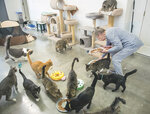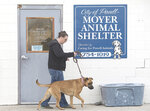Mostly Cloudy, 64° F
With her big brown eyes, Athena stares through the fence of her kennel with hope at every person who walks into Powell’s Moyer Animal Shelter. But few people are looking to adopt a dog these …
This item is available in full to subscribers.
The Powell Tribune has expanded its online content. To continue reading, you will need to either log in to your subscriber account, or purchase a subscription.
If you are a current print subscriber, you can set up a free web account by clicking here.
If you already have a web account, but need to reset it, you can do so by clicking here.
If you would like to purchase a subscription click here.
Please log in to continue |
|




With her big brown eyes, Athena stares through the fence of her kennel with hope at every person who walks into Powell’s Moyer Animal Shelter. But few people are looking to adopt a dog these days and Athena has been a fixture at the shelter for more than two years.
Athena is a black mouth cur, an energetic, fearless and strong dog that was bred to help farmers and hunters in rugged terrain. These all-around working dogs can herd livestock, protect the home and track game. However, they also have a sensitive side and respond best to positive reinforcement. Athena is a favorite with volunteers at the shelter due to her gentle ways, but life in the impoundment is a far cry from a forever home.
On Thursday, volunteer Celena Shaffer Cornett decided to give Athena a nice break from the shelter. Her plan was to take her home for the night to see how she’d react to a home with children. She was aware that Athena probably won’t ever be best friends with cats or birds, but that’s typical for canines. Just getting her in the family vehicle was somewhat of a chore. She’s good on a leash, but without previous experience in vehicles, Athena was afraid to jump in the back of Cornett’s vehicle. But she learns quickly and off they went.
“She just wants love and attention,” Cornett wrote on a Facebook post showing a video of Athena enjoying the field trip. “She did good with my girls during the visit.”
Athena is just one of many dogs and cats available at local shelters. Both Powell and Cody shelters are near capacity with pets looking to be rehomed and are forced to turn away animals when the inn is full.
According to Elfriede Milburn, who co-founded the Moyer Animal Shelter in 1997, inflation has slowed adoptions. The cost of caring for dogs and cats, along with every household expense, has gone up significantly since 2020, forcing many to look for ways to cut their budgets. Unfortunately, pets and shelters are suffering from many of those cuts.
Termed ‘petflation’ by some in the industry, increasing food costs have had a huge effect on shelters. Donations don’t go as far these days and some have disappeared all together. The additional costs are putting a strain on their budgets and, as they’re at occupancy limits with pets needing to be adopted, many animals needing assistance are in jeopardy.
But, at the same time many pet owners are making tough budget decisions, the pet food industry is thriving. More than $53 billion was spent on pet foods in the U.S. in 2023, which is up more than 37% in the past five years according to the U.S. Department of Agriculture. But for the first time in recent history, the increase in sales growth in 2023 was driven almost entirely by higher prices instead of increased sales and upgrades to premium foods.
A survey published in the 17th edition of Pet Food in the U.S. shows one-third of American customers have changed pet foods in the previous 12 months; of those, 32% of dog owners and 28% of cat owners said they traded down to lower-priced products to help with the bottom line.
This appears to be a reaction to overall inflation since the pandemic, including the raising cost of pet food. Yet, even as the pandemic subsides, pet food costs continue to increase, according to John Gibbons, aka the Pet Business Professor. About 20% of the overall 23.1% increase since the start of the pandemic have occurred since 2022.
High inflation and higher interest rates continue to weigh on American households, according to a new LendingClub report. As of November, 62% of adults said they are living paycheck to paycheck.
Caught in the middle are shelters — often the last chance for abandoned pets. Many facilities are full, including in Park County, and at times unable to offer help. In Powell, the Moyer Animal Shelter is at its occupancy limit and in Cody they have room for some cats, but the space for dogs is extremely limited.
“We’re pretty full,” warned Jona Harris, new executive director of the Park County Animal Shelter. “I think all we could take is one or two dogs, max.”
When the shelters fill up, they have to turn away pets. Having no room for pets in transition often ends in owners dumping the pets, forcing them to fend for themselves in hostile environments. With harsh winter weather returning to the area, it could be a death sentence for some animals.
Moyer Animal Shelter part-time employee Barb Muecke, who has been employed there for the past 23 years, works the afternoon shift and does the purchasing for the facility. She said she sees many of the people looking to re-home their pets. She is sadly also forced to turn away pets when they run out of room.
“It’s hard,” she said, saying few making the decision are willing to take the time necessary to find a good home. “They want them gone right now.”
The shelter is starting off 2024 facing the loss of its largest retail donor and now faces sticker shock for the purchase of additional meals, costing hundreds of dollars more per month. Worse yet is that so few are looking to adopt, said Milburn.
“Nobody comes anymore,” the 85-year-old said while dishing out breakfast for their more than 30 cats and 11 dogs. “We’ve had one dog here for years,” she said, gesturing to Athena.
Milburn said the current situation might require divine intervention. It’s not the worst she’s ever seen, but a single visit reveals just how dire the situation has become. Dogs fill every kennel and 30 cats share a single indoor room; more are in the nursery recovering from illness and injuries.
When a dog or cat is picked up by Powell’s animal control, they are brought to the shelter, which also serves as the city’s animal impoundment. More recently, the dogs have been dumped in Powell or rural areas between Powell and Cody. Both facilities in Park County are no-kill shelters.
Having witnessed extreme heartbreak for the past 27 years of dedication to the humane treatment of the animals, she said she can’t think about retirement. “Especially not now. This is what I have to do. I’m just part of it and I’ll probably die here,” she said.
Despite adversity, she said she has several reasons for hope; much of it coming from dedicated employees and volunteers. A few new animal lovers have stepped up to volunteer.
It’s easy to romanticize the volunteer positions, but it’s a lot of hard work. Linda Stokes spent her volunteer hours last week feeding the nearly three dozen cats and then on hands and knees cleaning litter boxes.
“The animals need it,” she said when asked why she chose to volunteer at the shelter. “I love being around them and giving them some love and hope.”
In Cody, there are a handful of consistent volunteers, Harris said. But they need more.
“I would really like to grow and nurture our volunteer program,” she said.
They also need more donations. They are hoping to find folks who are willing to make small monthly donations, amounting to the cost of a cup of coffee.
“Costs keep going up. Just to operate our new building takes a lot more than it used to. So we are kind of looking for more small monetary, monthly gifts,” she said.
It isn’t just food and kitty litter needed. The cost of utilities and cleaning supplies like bleach and paper towels and office supplies have all increased as well.
In an attempt to bring in more money, the Park County Animal Shelter is now accepting reservations to host birthday parties in their community room, Harris said. They have to be more creative to keep up with expenses. It benefits both the families looking for a fun venue and the pets at the shelter, she said.
“I think it will be a really cool thing that the community will really love. It’s hard to find places to have a birthday party. And I think that the animals will absolutely love having kids here to love on them.”
Harris is in her first month at the facility and is the fourth executive director the shelter has seen in the past four years.